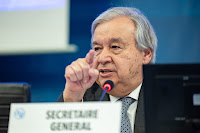(Another installment of the Transcript Project at CofA Blog, documenting our strange times in AI Generated print)
"This past Sunday Monday and Tuesday were the three hottest days on record. Extreme temperatures are no longer a one day one week or one month phenomenon. Extreme heat is the new abnormal."
"Today we are launching a Global Call To Action"
"Extreme Heat: UN Secretary-General's Call to Action" Streamed live on Jul 25, 2024 (link below)
António
Guterres: It's summertime but the living is no longer easy. This has been a
week of unprecedented heat. First the European Union's Copernicus climate
change service declared Sunday July 21st as the hottest day on record. Then on
Monday July 22nd the Mercury climbed even higher. And now we have just received
preliminary data indicating that Tuesday July 23rd was in the same range. In other
words this past Sunday Monday and Tuesday were the three hottest days on record.
But let's
face facts.
 |
| Guterres |
Extreme temperatures are no longer a one day one week or one month's phenomenon. If there is one thing that unites our divided world, it is that we are all increasingly feeling the fact that Earth is becoming hotter and more dangerous for everyone. Everywhere billions of people are facing an extreme heat epidemic, wilting under increasingly deadly Heat.
Heat waves with temperatures topping °50C around the world, that's 122° Fahrenheit and halfway to Boiling. This year we have seen a deadly Heatwave hit the Cil with spiking hospitalizations and death and broken temperature records across the United States reportedly displacing 120 million people and heat advisory Warnings.
Scorching
conditions have killed 1300 pilgrims during Hajj, shut down tourist attractions
in Europe sweet box cities, and closed schools across Asia and Africa,
impacting more than 80 million children.
Of course
summer heat is as old as the hills. But the world meteorological organization,
the intergovernmental panel on climate change, and others have documented a
rapid rise in the scale intensity frequency and duration of extreme heat events.
And it
comes against the background of ever Rising temperatures with June officially
the 13th consecutive months to break Global temperature records. Extreme heat
is increasingly tearing through economies, widening inequalities, undermining
the sustainable development goals, and killing people, in fact heat is
estimated to kill almost half a million people a year, and that's about 30
times more than tropical Cyclones.
We know
what is driving it: fossil fuel charged human induced climate change. And we
know it's going to get worse. Extreme heat is the new abnormal.
But the
good news news is that there are solutions. The good news is that we can save
lives and we can limit its impact.
And so
today we are launching a Global Call To Action with four areas of focus: first
caring for the most vulnerable.
Crippling
heat is everywhere but it doesn't affect everyone equally. Those most at risk
when the Mercury soars include the urban poor, pregnant women, people with disabilities,
older people, the very young, the sick, the displaced, and the impoverished who
often live in substandard housing without access to cooling.
For
example heat related deaths for people over 65 years of age increased around 85%
in 20 Years….
So we
must respond by massively increasing access to low carbon cooling, expanding
passive cooling such as natural solutions and Urban Design, and cleaning up
cooling Technologies while boosting their efficiency… slashing emissions and saving consumers trillions
US dollars a year.
END OF TRANSCRIPT
More from UN channel: Earth is becoming hotter and more dangerous for everyone, everywhere. Billions of people around the world are wilting under increasingly severe heatwaves driven largely by a fossil-fuel charged, human-induced climate crisis. Extreme heat is tearing through economies, widening inequalities, undermining the Sustainable Development Goals, and killing people.
The Call for Action calls for an urgent and concerted effort to enhance international cooperation to address extreme heat in four critical areas: Caring for the vulnerable - Protecting workers - Boosting resilience of economies and societies using data and science - Limiting temperature rise to 1.5°C by phasing out fossil fuels and scaling up investment in renewable energy.
***
(Watch the entire Guterres speech on YouTube here https://www.youtube.com/watch?V=utcp_fomgfw )
Weblogged by Kay Ebeling
Former professional transcriber


No comments:
Post a Comment